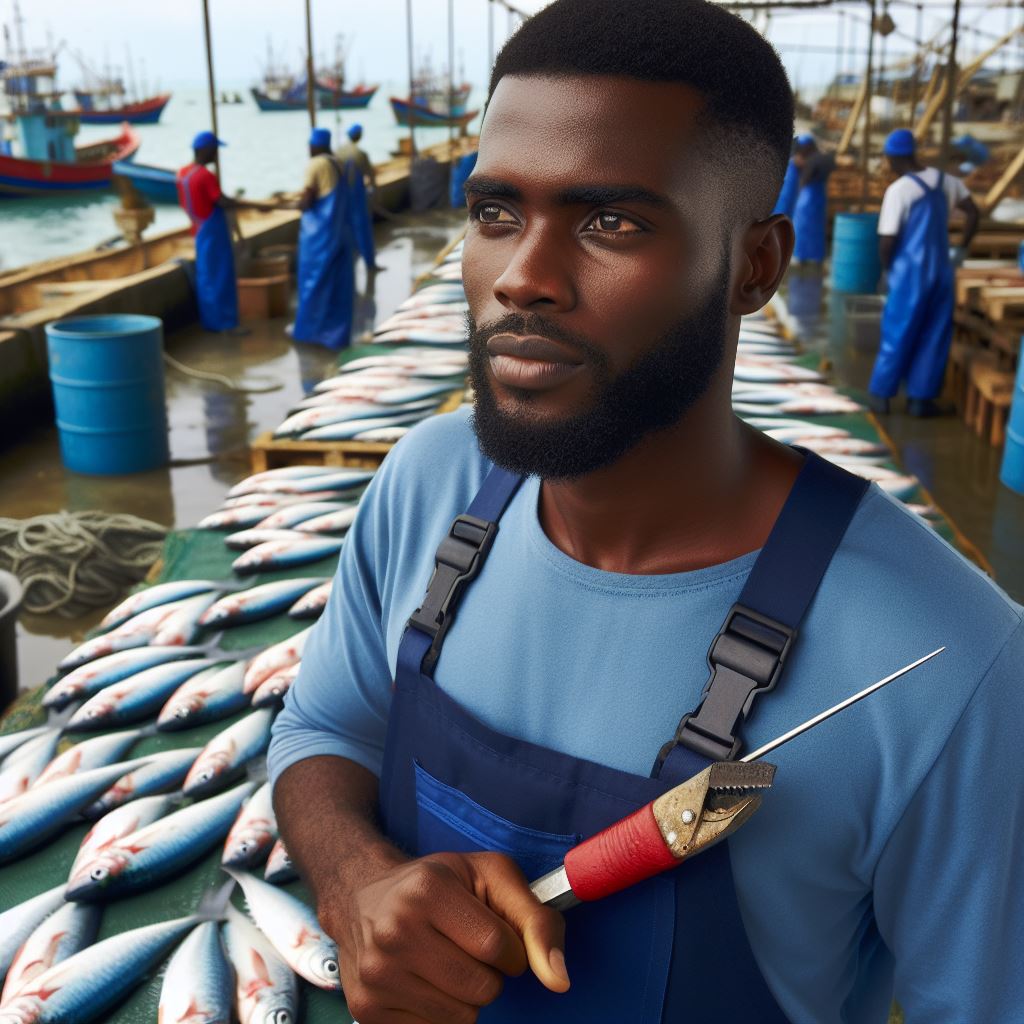Introduction
Challenges and Opportunities in Nigerian Fisheries Sector: Nigeria, endowed with a vast coastline and abundant inland water resources, boasts a thriving fisheries sector that plays a pivotal role in the nation’s economy.
The fisheries industry in Nigeria is characterized by its diversity, encompassing marine and inland fisheries, aquaculture, and associated activities.
These contribute significantly to the country’s food security, employment, and foreign exchange earnings.
Nigerian fisheries are multifaceted, with marine fisheries exploiting the rich resources of the Atlantic Ocean, while inland fisheries tap into the abundance of rivers, lakes, and reservoirs.
The sector is a source of livelihood for millions, particularly those in coastal and riverine communities, where fishing has been a traditional way of life for generations.
The economic importance of the fisheries sector cannot be overstated. It serves as a vital source of animal protein for the nation, meeting the dietary needs of a large segment of the population.
Beyond sustenance, fisheries contribute significantly to Nigeria’s GDP and provide employment opportunities, particularly in rural areas where alternative livelihoods are often limited.
Moreover, the fisheries sector is a key player in the nation’s quest for economic diversification.
Fish exports contribute substantially to foreign exchange earnings, bolstering Nigeria’s economic resilience and reducing dependence on oil revenue.
As the world recognizes the importance of sustainable food systems, Nigeria’s fisheries sector stands poised to play a crucial role in meeting global demands for responsibly sourced seafood.
In the face of these opportunities, challenges abound.
The next sections will delve into the intricacies of the Nigerian fisheries sector, exploring the obstacles that hinder its full potential and the innovative solutions that can pave the way for a more robust and sustainable future.
Read: Scholarships & Grants for Toxicology Students in Nigeria
Challenges in the Nigerian Fisheries Sector
The Nigerian fisheries sector faces numerous challenges that hinder its potential for growth and development.
These challenges, if not addressed effectively, could have detrimental effects on the country’s economy, food security, and environmental sustainability.
Overfishing and Depletion of Fish Stocks
A major issue in the sector is the overfishing and depletion of fish stocks.
The persistent practice of unsustainable fishing methods, such as large-scale trawler fishing and the use of illegal gear, has led to the decline of fish populations.
Without proper regulation and enforcement of fishing regulations, these unsustainable practices continue unchecked, threatening the long-term viability of the fisheries sector.
Poor Infrastructure and Inadequate Facilities
Another pressing challenge is the poor infrastructure and inadequate facilities.
Insufficient cold storage and processing facilities result in post-harvest losses due to fish spoilage and wastage.
This not only affects the economic gains of fishermen but also hampers the availability of fresh fish in local and international markets.
Additionally, inadequate transportation and distribution networks make it difficult to efficiently move fish products from coastal areas to consumers, leading to delays and potential spoilage.
Weak Governance and Ineffective Policies
Weak governance and ineffective policies are also significant constraints in the Nigerian fisheries sector.
The inconsistent implementation of fisheries management plans undermines efforts to sustainably manage fish resources.
This lack of coordination and commitment hinders the sector’s ability to respond to changing environmental conditions and evolve towards responsible and sustainable fishing practices.
Moreover, corruption within the sector and illegal fishing activities further deteriorate the situation, undermining existing regulations and exacerbating the depletion of fish stocks.
To address these challenges, it is crucial for the Nigerian government and stakeholders to take proactive measures.
Implementing stricter enforcement of fishing regulations will help combat unsustainable practices and promote responsible fishing.
Investing in the development of infrastructure, such as expanding cold storage and processing facilities, will enhance post-harvest handling and reduce spoilage rates.
Additionally, improving transportation and distribution networks will enable more efficient and timely delivery of fish products to markets.
Enhancing governance and policies in the fisheries sector is vital for its long-term sustainability.
Consistent implementation of fisheries management plans should be prioritized, supported by comprehensive monitoring and evaluation systems.
Efforts to tackle corruption and illegal fishing activities must be intensified through collaboration between law enforcement agencies, fisheries authorities, and local communities.
While challenges persist in the Nigerian fisheries sector, recognizing these issues and implementing strategic interventions can unlock opportunities for growth and development.
This includes the potential for job creation, income generation, and improved food security.
By adopting sustainable fishing practices, investing in infrastructure, and strengthening governance mechanisms, the Nigerian fisheries sector can overcome its challenges and contribute significantly to the socioeconomic development of the country.
Read: Career Opportunities after Fisheries Education in Nigeria

See Related Content: Urban Horticulture Trends in Nigeria
Opportunities in the Nigerian Fisheries Sector
Expanding domestic and international market demand
The Nigerian fisheries sector has significant opportunities for growth in both domestic and international markets.
These opportunities stem from increasing population levels and evolving dietary patterns. As more people join the population, there is a greater demand for fish and seafood products.
Transform Your Career with Expert Guidance
Get personalized mentorship consulting that’s tailored to your unique path. Our expert advice is actionable and exclusive.
Get StartedAdditionally, the changing dietary preferences of Nigerians have resulted in a higher consumption of fish as a source of protein and essential nutrients.
Furthermore, there is a growing global demand for seafood products.
As international markets continue to expand, Nigerian fishers have the opportunity to export their products to foreign countries where there is a high demand for seafood.
This presents a chance for the Nigerian fisheries sector to contribute to the growth of the national economy through international trade.
Potential for aquaculture development
Aquaculture development holds great potential for the Nigerian fisheries sector.
By investing in aquaculture, the sector can reduce its dependence on wild fish stocks, which are increasingly threatened by overfishing and environmental degradation.
Aquaculture allows for controlled and sustainable fish farming, ensuring a consistent supply of fish products.
Moreover, the development of aquaculture can lead to the creation of employment opportunities.
By expanding fish farming practices, more jobs can be generated in various stages of the aquaculture value chain, including fish production, processing, and marketing.
This not only benefits the economy but also supports the livelihoods of many Nigerians.
Innovation and technological advancements
Innovation and technological advancements present exciting opportunities for the Nigerian fisheries sector.
By adopting modern fishing methods and equipment, fishers can improve their catch efficiency while reducing the environmental impact of their activities.
This allows for sustainable fishing practices and ensures the long-term viability of the sector.
Furthermore, the adoption of technology can enhance efficiency and productivity along the value chain.
From fish processing to marketing, the incorporation of technological advancements can streamline operations, reduce wastage, and improve the overall quality of fish and seafood products.
These advancements have the potential to drive economic growth and increase competitiveness in both domestic and international markets.
In short, the Nigerian fisheries sector offers vast opportunities for growth and development. Expanding domestic and international market demand, capitalizing on aquaculture development, and embracing innovation and technological advancements are key factors that contribute to the sector’s potential.
By capitalizing on these opportunities, the Nigerian fisheries sector can not only contribute to food security but also drive economic development and improve the livelihoods of its stakeholders.
Read: Job Market Analysis: Environmental Management in Nigeria
Way Forward: Strategies to Address Challenges and Tap Opportunities
In order to overcome the challenges and make the most of the opportunities in the Nigerian fisheries sector, several strategies need to be implemented.
These strategies focus on strengthening fisheries management and regulation, infrastructure development and investment, policy reforms, and promoting aquaculture and innovation.
Strengthening fisheries management and regulation
To begin with, it is crucial to enforce sustainable fishing practices. This involves setting limits on fishing activities, protecting vulnerable species, and promoting responsible fishing methods.
Additionally, enhancing monitoring and surveillance systems can help in detecting and preventing illegal fishing practices.
Infrastructure development and investment
Infrastructure development plays a vital role in improving the overall efficiency of the fisheries sector.
To this end, it is important to improve cold storage and processing facilities, ensuring that the fish caught are adequately preserved and processed.
Upgrading transportation and distribution networks is also essential to enable swift and efficient movement of fish to markets and consumers.
Policy reforms and good governance
Policy reforms and good governance are necessary to ensure sustainable growth in the fisheries sector.
Implementing effective fisheries management plans will help in regulating fishing activities, setting clear guidelines, and promoting responsible resource management.
It is equally important to address corruption and illegal fishing activities which undermine the sustainability of the sector.
Promoting aquaculture and innovation
Furthermore, promoting aquaculture can alleviate the pressure on wild fish stocks and enhance domestic fish production.
Providing support for fish farming ventures, such as access to financing and technical assistance, can encourage more individuals and communities to engage in fish farming.
Additionally, encouraging research and development in the fisheries sector can lead to innovation and improved practices, ultimately resulting in increased productivity and profitability.
In essence, the challenges and opportunities in the Nigerian fisheries sector require a comprehensive approach.
By strengthening fisheries management and regulation, investing in infrastructure development, implementing policy reforms, and promoting aquaculture and innovation, the sector can overcome its challenges and tap into its potential.
These strategies, when implemented effectively, can contribute to the sustainable growth and development of the Nigerian fisheries sector, benefiting both the economy and the livelihoods of the people involved in the sector.
Read: Nigerian Research Highlights in Environmental Toxicology
Conclusion
The Nigerian fisheries sector faces challenges such as overfishing, inadequate infrastructure, lack of access to finance, and inadequate regulatory frameworks.
However, it also presents opportunities for sustainable development and growth.
Overfishing has led to declining fish stocks, threatening the livelihoods of fishermen and the food security of the nation.
Inadequate infrastructure, such as cold storage facilities and transportation systems, hinders the growth of the sector.
The lack of access to finance limits the ability of fishermen to invest in modern fishing equipment and technologies, while inadequate regulatory frameworks fail to enforce sustainable fishing practices.
Despite these challenges, there are opportunities for the Nigerian fisheries sector. The country’s vast coastline and inland water bodies offer immense potential for increased fish production.
Investments in infrastructure, such as the establishment of processing plants and improved transportation systems, can enhance the value chain and increase the sector’s contribution to the economy.
To harness these opportunities and overcome the challenges, all stakeholders must work towards sustainable development and growth in the Nigerian fisheries sector.
To address overfishing, stakeholders should collaborate to implement and enforce sustainable fishing practices.
This includes establishing catch limits, promoting responsible fishing methods, and investing in research and monitoring systems.




